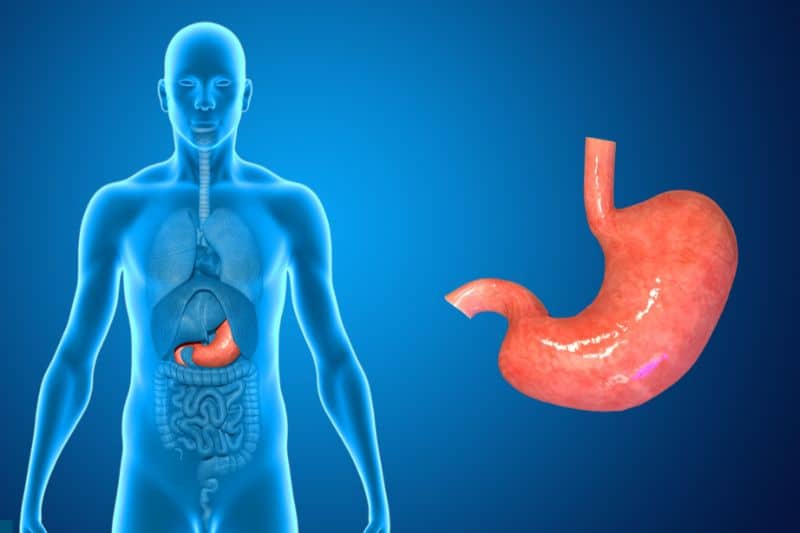When it comes to understanding your body, you might be curious about how much certain organs like the stomach weigh. Your stomach plays a crucial role in digestion, and knowing its size and weight can also help maintain a balanced diet and manage portion sizes.
The weight of your stomach can vary depending on factors like your age, sex, and body size. On average, an adult human stomach weighs about 4.5 ounces (130 grams) when empty.
The stomach is quite adaptable and flexible and can accommodate a significant amount of food, expanding to hold up to 1 liter (34 ounces) or more. When full, it can weigh much more than when empty.
Learning more about your body and how its different parts function is fascinating. Knowing the weight of your stomach can provide valuable insight into your overall health and dietary habits. So, next time you’re curious, you can remember that the average stomach weight is just around 4.5 ounces when empty!
Read: How Much Does the Spleen Weigh? (Answered)
An adult’s stomach typically weighs between 4.5 to 5.5 ounces (128 to 156 grams). Remember that factors such as age, sex, and overall body weight can affect the weight of your stomach. It might be a bit heavier in males compared to females.
Measuringly.com
Anatomy of the Stomach
The stomach is a fascinating organ that is vital to your body’s digestive process. In this section, we’ll explore the basic anatomy of the stomach, focusing on its four main parts and the different layers that make up its wall.
Four Main Parts of the Stomach
Your stomach is divided into four key regions, each with its unique function:
- Cardia: The cardia is the small area where food enters the stomach. It prevents stomach contents from flowing back into the esophagus.
- Fundus: The fundus is an expanded area that stores gas and incoming food. This region also secretes acid that helps break down food particles.
- Body: The body is the largest part of the stomach. It’s where most digestion and absorption processes occur, thanks to the production of enzymes and acids.
- Pylorus: The pylorus is a narrow funnel-shaped region that connects the stomach to the small intestine. It controls the passage of food from the stomach to the intestines.
The Stomach Wall Layers
The stomach wall consists of four primary layers, each with a specific responsibility:
- Mucosa: The innermost layer is called the mucosa. This layer contains mucous-secreting cells, which help protect the stomach lining from corrosive acids. Glands in the mucosa also secrete enzymes and acids that aid digestion.
- Submucosa: The submucosa is the layer that supports the mucosa. It houses blood vessels, nerves, and lymphatic vessels, nourishing and sending signals to other parts of the digestive system.
- Muscularis externa: As you might guess, this layer consists of muscle tissue. The muscularis externa contracts and relaxes to mix and propel the food towards the pylorus.
- Serosa: The serosa is the outermost layer that helps protect the stomach from friction as it moves and expands. It secretes a thin, watery fluid that lubricates the stomach’s surface.
These four layers work together harmoniously, allowing your stomach to perform its crucial role in the digestive process. With this understanding of the stomach’s anatomy, you can better appreciate the intricate design of this essential organ.
Stomach Weight Range
Your stomach is an important organ responsible for breaking down and processing food. It might be surprising to learn that its weight varies among individuals. An adult’s stomach typically weighs between 4.5 to 5.5 ounces (128 to 156 grams).
Remember that factors such as age, sex, and overall body weight can affect the weight of your stomach. It might be a bit heavier in males compared to females. Furthermore, like other organs, the stomach can change in size and weight depending on external factors like diet and hydration levels.
Interestingly, your stomach can expand and contract depending on the volume of its contents. This explains why it feels fuller after a substantial meal or emptier during periods of hunger. As a result, the weight of your stomach can increase temporarily following a large meal or decrease after fasting.
In conclusion, the weight of a human stomach can vary based on a range of intrinsic and extrinsic factors. However, it generally falls within the range of 4.5 to 5.5 ounces for adults.
Factors Influencing Stomach Weight
Several factors come into play when it comes to the weight of your stomach. In this section, we’ll discuss how age, body size, and sex can influence the weight of your stomach.
Age
As you age, the size and weight of your stomach may change. It’s common for the stomach to lose some of its elasticity and become smaller over time. This change may lead to a decrease in the stomach’s weight.
However, keep in mind that other age-related factors, such as changes in muscle mass and overall body composition, can also impact stomach weight.
Body Size
Your body size plays a significant role in determining the weight of your stomach. A larger individual will generally have a larger stomach than someone who is smaller in stature, all else being equal. Variations in body types, such as differences in muscle mass or internal organ size, also contribute to differences in stomach weight.
Sex
Men and women typically have different stomach weights due to differences in body composition and body fat distribution. On average, men tend to have larger stomachs than women, which generally results in a higher stomach weight. However, these differences can vary among individuals due to genetics and lifestyle choices.

Conditions That Can Alter Stomach Weight
Obesity
Being obese can have a direct impact on the weight of your stomach. Excess fat can accumulate around the stomach, leading to an increase in its size and weight.
Moreover, obesity can affect your stomach’s muscles and tissue structure, leading to a thicker stomach wall. Maintaining a healthy lifestyle, including regular exercise and a balanced diet, is essential to prevent obesity and keep your stomach weight in check.
Eating Disorders
Eating disorders, such as anorexia and bulimia, can also alter the weight of your stomach. Anorexia nervosa often results in a decreased stomach weight due to decreased food intake and muscle atrophy.
On the other hand, bulimia nervosa can lead to an expanded stomach, as frequent binge-eating episodes stretch the stomach muscles. Seeking professional help and adopting a healthy relationship with food are crucial steps in managing and recovering from these eating disorders.
Gastric Diseases
Some gastric diseases and conditions can affect the weight of your stomach. For example:
- Gastric ulcers: These open sores in the stomach lining can lead to inflammation and swelling, increasing the stomach’s weight.
- Gastric cancer: Tumors growing in the stomach can also contribute to a change in stomach weight.
- Gastroparesis: This condition is characterized by delayed gastric emptying, which can cause the stomach to retain more food than usual, increasing its weight.
If you suspect that you are dealing with a gastric disease or related symptoms, it’s essential to consult a healthcare professional for a proper diagnosis and treatment plan. You can manage these conditions effectively and maintain a healthy stomach weight.
What’s the Capacity of a Baby’s Stomach?
Learning about your baby’s development and how their little body functions can be fascinating as a new parent. One crucial aspect of your baby’s growth is their stomach capacity. Don’t worry, we’ll keep it friendly and informative for you!
During the first few days of life, your baby’s stomach is quite small, capable of holding only small amounts of milk. At birth, their stomach capacity is about the size of a marble, approximately 5-7 milliliters. This is why newborns need frequent feedings, as their tiny stomachs can’t accommodate much food at once.
As your baby grows, their stomach capacity gradually increases. By the end of their first week, their stomach capacity is about the size of a walnut, or around 45-60 milliliters. This means your baby can comfortably consume more milk at each feeding, allowing for slightly longer periods between feedings.
By the time your baby reaches one month of age, their stomach capacity has expanded even further, now able to hold around 80-150 milliliters. This growth in capacity helps support your baby’s increasing nutritional needs as they continue to develop.
Remember that every baby is unique, and their stomach capacity may vary slightly. It’s essential to monitor your baby’s cues for hunger and satiety to ensure they’re adequately nourished. If you have any concerns about your baby’s feeding or growth, don’t hesitate to consult with your pediatrician for guidance and support.
Read: How Much Does a Kidney Weigh: Your Guide to Kidney
Does Your Stomach Expand When You Gain Weight?
Your stomach is an amazing organ that can expand and contract to accommodate various amounts of food and liquids. It’s normal for your stomach to expand when you eat a large meal and then shrink back down once the meal has been digested. But does your stomach expand when you gain weight?
When you gain weight, most of it comes from increased body fat, not stomach capacity. However, some increase in stomach size might occur due to the excess fat pushing on the stomach walls. This can primarily result from unhealthy lifestyle habits like overeating and irregular meal timings.
Obesity can affect different aspects of the digestive system, including your stomach and its ability to empty. The excess fat around your abdomen may slow down the stomach-emptying process, which could lead to feelings of discomfort and indigestion. This could create a sense of a larger or bloated stomach, but the actual capacity of your stomach might not change significantly.
Maintaining a healthy body weight is essential to properly functioning your digestive system. Adopting a balanced diet and regular exercise can help you maintain a healthy weight and avoid potential stomach issues. Remember that moderation is key, and taking care of your body ultimately supports your overall well-being.







